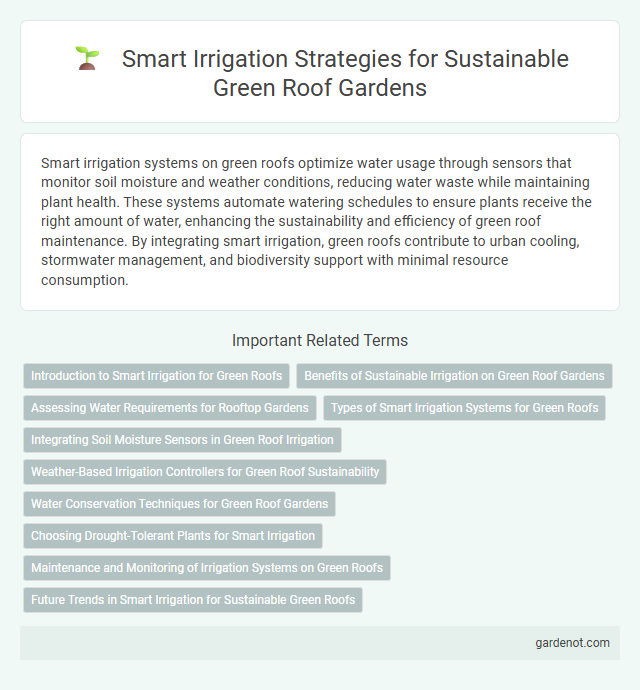Smart irrigation systems on green roofs optimize water usage through sensors that monitor soil moisture and weather conditions, reducing water waste while maintaining plant health. These systems automate watering schedules to ensure plants receive the right amount of water, enhancing the sustainability and efficiency of green roof maintenance. By integrating smart irrigation, green roofs contribute to urban cooling, stormwater management, and biodiversity support with minimal resource consumption.
Introduction to Smart Irrigation for Green Roofs
Smart irrigation systems for green roofs use sensor technology and automated controls to optimize water usage, reducing waste and promoting healthy plant growth. These systems monitor soil moisture, weather conditions, and evapotranspiration rates to deliver precise watering tailored to the specific needs of the vegetation. Implementing smart irrigation enhances sustainability, lowers maintenance costs, and improves the overall performance of green roofs in urban environments.
Benefits of Sustainable Irrigation on Green Roof Gardens
Smart irrigation systems in green roof gardens optimize water usage by delivering precise amounts based on real-time soil moisture and weather data, significantly reducing water waste. Sustainable irrigation enhances plant health and biodiversity by maintaining ideal hydration levels, promoting robust root growth and drought resilience. Energy efficiency is improved through reduced water pumping needs, lowering overall operational costs and minimizing environmental impact.
Assessing Water Requirements for Rooftop Gardens
Smart irrigation systems for green roofs utilize real-time data on soil moisture, weather patterns, and plant water needs to optimize water usage efficiently. Accurate assessment of water requirements involves monitoring evapotranspiration rates and microclimate conditions specific to rooftop environments. Integrating sensors and automated controls reduces water waste and promotes sustainable maintenance of rooftop gardens.
Types of Smart Irrigation Systems for Green Roofs
Smart irrigation systems for green roofs include drip irrigation, which delivers water directly to plant roots, minimizing waste and promoting efficient usage. Sensor-based systems use soil moisture sensors and weather data to automatically adjust watering schedules, ensuring optimal hydration without overwatering. Automated sprinkler systems with programmable timers offer precise control over watering times, reducing water consumption and supporting sustainable green roof maintenance.
Integrating Soil Moisture Sensors in Green Roof Irrigation
Integrating soil moisture sensors into green roof irrigation systems allows precise monitoring of substrate moisture levels, optimizing water use and reducing waste. These sensors enable automated irrigation scheduling based on real-time data, improving plant health and extending irrigation system lifespan. Smart irrigation technology enhances sustainability by conserving water resources while maintaining green roof vitality in urban environments.
Weather-Based Irrigation Controllers for Green Roof Sustainability
Weather-based irrigation controllers optimize water use on green roofs by adjusting irrigation schedules according to real-time weather data and soil moisture levels. These smart systems reduce water waste while maintaining plant health and enhancing green roof sustainability. Integrating sensors and predictive analytics ensures efficient water management, supporting urban heat island mitigation and stormwater retention.
Water Conservation Techniques for Green Roof Gardens
Smart irrigation systems for green roof gardens utilize soil moisture sensors and automated drip irrigation to optimize water usage, significantly reducing runoff and evaporation. These systems integrate weather data and plant-specific water requirements, ensuring precise watering schedules that conserve water while promoting healthy vegetation growth. Implementing smart irrigation technology on green roofs contributes to sustainable urban landscapes by minimizing water waste and enhancing the efficiency of water conservation efforts.
Choosing Drought-Tolerant Plants for Smart Irrigation
Selecting drought-tolerant plants for smart irrigation green roofs reduces water consumption while enhancing plant survival and growth under variable moisture conditions. Succulents, native grasses, and hardy perennials thrive with minimal irrigation, optimizing water efficiency through adaptive root structures and reduced evapotranspiration. Integrating these species with sensor-driven irrigation systems ensures precise water delivery, promoting sustainability and lowering maintenance costs.
Maintenance and Monitoring of Irrigation Systems on Green Roofs
Smart irrigation systems for green roofs utilize sensors and automated controllers to optimize water usage, reducing waste and promoting plant health. Regular maintenance involves checking sensor calibration, ensuring valve functionality, and clearing filters to prevent clogging and system failure. Continuous monitoring through remote platforms enables early detection of leaks, moisture imbalances, and system malfunctions, enhancing sustainability and lowering operational costs.
Future Trends in Smart Irrigation for Sustainable Green Roofs
Future trends in smart irrigation for sustainable green roofs emphasize the integration of IoT sensors and AI-driven analytics to optimize water use and reduce waste. Advanced moisture and weather sensors enable real-time adjustments to irrigation schedules, enhancing plant health and conserving resources. Predictive maintenance using machine learning models improves system efficiency and extends the lifespan of green roof infrastructure.
Smart irrigation green roof Infographic

 gardenot.com
gardenot.com